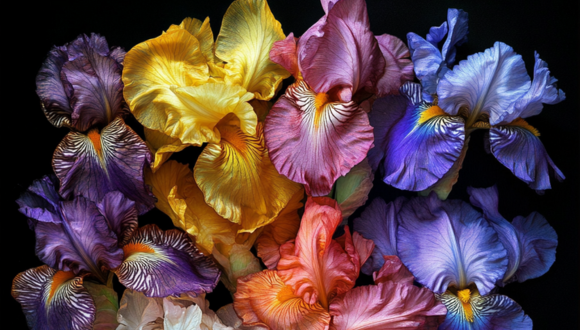אבולוציה
הבנת תהליכים אבולוציוניים בצמחים חיונית להבנת תפקוד הצמח בטבע, לפיתוח חקלאות מותאמת אקלים, ולשימור מינים ובתי גידול. תובנות מתחום זה מסייעות גם בזיהוי מקורות גנטיים חשובים לשיפור יבולים, בהתמודדות עם שינויי אקלים, ובשימור המגוון הביולוגי. המחקר האבולוציוני מאפשר לנו לראות את העולם הביולוגי בפרספקטיבה עמוקה של זמן, ולהבין את הקשרים המורכבים בין אורגניזמים, סביבתם, ומורשתם הגנטית.
"דבר אינו מובן בביולוגיה, אלא לאור האבולוציה" (תאודוסיוס דובז'נסקי, 1973).
אבולוציה היא תהליך היסוד שמסביר את המגוון העצום של צורות חיים ותפקודיהן. היא פועלת על פני דורות, וכוללת שינויים מורפולוגיים, פיזיולוגיים וגנטיים אשר מתרחשים בתגובה ללחצי סלקציה מהסביבה ולשינויים מקריים באוכלוסיות. בצמחים, תהליך זה מעצב את מבנה העלים והשורשים, את אסטרטגיות הרבייה, יחסי הגומלין עם מאביקים ואוכלי עשב, ואת תגובותיהם לשינויים סביבתיים ואקלימיים.
המחקר האבולוציוני בבית הספר מקיף קשת רחבה של תחומים ומערכות מחקר. חוקרי בית הספר עוסקים בין היתר באבולוציה של דפוסי פריחה וצבעי פרחים במינים מואבקי חרקים, באבולוציה של תכונות התנהגותיות בצמחים כמו תזמון נביטה והתאמה למשטרי אור, בהשפעת לחץ סביבתי על הפנוטיפ של צמחים במדבר, ובקצב השינויים הגנטיים במינים שונים לאורך סביבות משתנות. כמו כן, נחקרים תהליכים פלסטיים של תגובה לתנאי עקה, והסתגלויות פיזיולוגיות שמאפשרות קיום בטווח רחב של תנאים סביבתיים.
במחקרים נעשה שימוש במגוון שיטות: ניסויים מבוקרים בחממות, עיבוד וניתוח נתונים אקולוגיים מהשדה, פיתוח מודלים חישוביים להבנת דינמיקה אבולוציונית, וריצופים גנומיים של צמחים מאזורים שונים בארץ ובעולם. המחקר עוסק בצמחים מכל קבוצות החיים – מאצות וטחבים, דרך צמחי מודל נפוצים בגנטיקה וביולוגיה מולקולרית, ועד לצמחי בר ובתי גידול טבעיים בישראל וסביבותיה.
Understanding evolutionary processes in plants is essential for understanding plant function in nature, developing climate-resilient agriculture, and conserving species and habitats. Insights from this field also contribute to identifying important genetic resources for crop improvement, addressing climate change, and preserving biodiversity. Evolutionary research allows us to view the biological world through a deep-time perspective and to grasp the complex relationships between organisms, their environments, and their genetic heritage.
“Nothing in biology makes sense except in the light of evolution.”
– Theodosius Dobzhansky, 1973
Evolution is the fundamental process that explains the vast diversity of life forms and their functions. It operates across generations and involves morphological, physiological, and genetic changes that occur in response to environmental selection pressures and random changes within populations. In plants, this process shapes the structure of leaves and roots, reproductive strategies, interactions with pollinators and herbivores, and their responses to environmental and climatic changes.
Evolutionary research at the school spans a wide range of disciplines and study systems. Researchers investigate, among other topics, the evolution of flowering patterns and flower coloration in insect-pollinated species, the evolution of behavioral traits in plants such as germination timing and adaptation to light regimes, the effect of environmental stress on plant phenotypes in desert conditions, and the rate of genetic changes in different species across varying environments. Research also explores plastic responses to stress conditions and physiological adaptations that enable survival across a broad range of environmental conditions.
The studies employ a variety of methods: controlled greenhouse experiments, processing and analysis of ecological field data, development of computational models to understand evolutionary dynamics, and genomic sequencing of plants from different regions in Israel and around the world. The research encompasses plants from all life groups—from algae and mosses to commonly used model species in genetics and molecular biology, as well as wild plants and natural habitats in Israel and its surrounding regions.
Researchers in this field:
Prof. Itay Mayrose
The lab of Prof. Itay Mayrose specializes in computational biology and bioinformatics, with an emphasis on plant evolution and genomics. We use computational tools to gain insights into the fascinating evolutionary dynamics of plant genomes. In this process, we develop novel computational tools based on machine learning, reinforcement learning, and advanced probabilistic evolutionary models. Current projects in the lab include: (1) Whole genome duplications (polyploidy): Studying the consequences of whole genome duplications on patterns of lineage diversification, biogeography, and the effects of polyploidy on evolutionary patterns at the molecular and genomic levels. (2) Genome editing: We develop novel tools and algorithms for the optimal design of genome editing experiments and how to apply them in a large-scale manner, with special emphasis on crop improvement. (3) Phylogenetics: We develop machine learning methods for more accurate inference of phylogenetic trees and evolutionary genomic analyses.
Lab Website: https://www.tau.ac.il/~itaymay/index.html
Prof. Yuval Sapir
The Plant Evolutionary Ecology laboratory is studying the genetics and adaption of plants to their environment. We use ecological and genetic tools to understand the evolutionary mechanisms of plants adaptation. We study the role of pollinators and abiotic stresses as selection agents that shape flowers, as well as the effect of climate changes on plant adaptations and conservation. We use and perform ecological experimental design in controlled and natural conditions, fitness measurements and natural selection analyses, pollination biology – observations and experiments, genetic basis of flower colour, and gene expression in flower development.
Lab Website: https://labsapir.wixsite.com/labsapir
Prof. Yasmine Meroz
The lab studies computational and behavioral processes in plants; how plants process sensory information about the environment in order to shape their growth morphology. We study processes such as active sensing, decision-making, memory phenomena, and interaction between plants. Our research combines both theory and experiment. As part of our experiments we design and build tailored experimental setups with the aim of interrogating how plants integrate sensory information over space and time, with an image analysis pipeline. Experiments are generally informed by predictions of mathematical models and numerical frameworks, including 3D simulations of plant growth (tropisms and circumnutations), concepts from control theory and physics, the interplay with mechanics, and cost-benefit models.
Lab Website: https://www.merozlab.com/
Prof. Lilach Hadany
Our lab investigates open questions in the theory of evolution, and plant bioacoustics.
Evolutionary theory projects include the evolution of genetic variation, social behavior, host-microbiome interactions, language, and aging.
Plant bioacoustics projects include plant sound emission, interpretation of plant sounds, and plant responses to the sounds of animals and plants.
Lab capabilities: Mathematical modeling of evolutionary processes; plant recording; analysis of plant sounds
Services to the industry: none
Lab Website: https://www.hadanylab.com/
Prof. Michal Gruntman
In the Plant Ecology and Evolution lab, we study varying aspects of plant responses to their environment. We seek to learn the plastic responses and decisions plants make under changing environmental conditions, how plants evolve in response to these changes and the way these responses can be applied to deal with environmental issues, such as invasive species, heavy-metals, and light pollution. We perform controlled common-garden experiments using wild plants with varying evolutionary backgrounds, model species and invasive plants, to answer fundamental questions in ecology and evolution. We phenotype plant responses to environmental stresses, monitor plant movement and their pollinator visitations, analyse belowground root growth using specialized pots and root image analysis, and simulate plant light regimes with automatically light-controlled systems.
Lab Website: https://michalgruntman.wixsite.com/plantecol
Prof. Nir Ohad
The Ohad group is studying the role of plant epigenetics during reproduction, embryogenesis, and development from the seedling stage to adulthood. To understand these epigenetic mechanisms, we have been using Arabidopsis thaliana as a model for flowering plants and the moss Pyscomitrium patens, serving as a model for early terrestrial plants. To study the effects of environmental conditions on reproduction and dispersal strategies we use the mixed mating plant Lamium amplexicaule. In our studies we employ genetic, physiological, morphological, and theoretical tools along with molecular genetics, and biochemical tools including gene knockout, genome-wide methylation analysis, and transcriptomics.
Lab Website: https://en-lifesci.tau.ac.il/profile/niro



.png)

